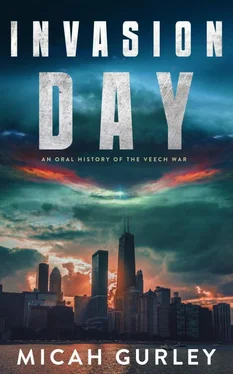The next day the lieutenant governor himself called and ordered me to help. I wasn’t so sure he could do that, nor am I today, but he told me every reserve soldier in America was being called back in, even those who were technically too old. He said they would have a problem with disease if they didn’t get Chicago cleaned up and that they needed me. He told me the Veech were in the East and weren’t concerned with dead cities. I wanted to ask where he got his information, but I finally agreed. I wanted to help anyway, but… I had a family. My sons were grown and assisting in the business, but their safety was the most important thing to me. We all talked about it, and everyone agreed we needed to help.
It wasn’t just me. Every funeral director in the state was ordered to help. Along with them, we were also given help from the Old Man’s Brigade. (Small smile.)I think it was the first day we had gotten there, and everyone was receiving directions about the area they would be working on when a group of buses, all painted black, pulls up and offloads a geriatric army. The guys were all old. The youngest had to be in his late 60s. But, for all that, they were spry and willing to help. The governor of the state called for any and all volunteers to help. All the young men were called away to fight, and so we got the geriatric army. We had younger people, of course, men and women who weren’t fit to fight, but wanted to help. But those old guys, they were the heroes.
Each section of the city was divided up, then assigned to a group of people. Each funeral director was appointed as the leader of their team. Mine consisted of 300 members. It wasn’t what I had trained for at all. My job back home was to take the body of a loved one and help the family through a tough time, direct them, and comfort them in the process. That was not what we did in Chicago. We couldn’t. There were almost three million dead in and around Chicago. Three million! The governor made a statewide address telling the people of the state that they could enter information about their loved ones into a website, and they would try to find them. (Shakes his head.)People used it, but not as many as you would think. Whole families died in the attack. Who would look for them? Not to mention, America had turned into a war zone. Then you had rioting and gas and food shortages. It was chaos. No, there weren’t many inquiries, and it wouldn’t have mattered if there were. What awaited us in that city gave nobody time to look at identification.
The first days into the city were a nightmare, something I still dream about, something I wish I could forget. Nobody was prepared for it. Intellectually, we knew the city was full of dead people, but seeing it, smelling it… was… it was in every sense of the word, a nightmare.
Our first zone was part of Aurora, which is an outer suburb of Chicago. It had almost 400,000 corpses. We rode in with some old maintenance trucks the state gave us and enough fuel to get us there. It had been nearly two weeks since the attack and the bodies were decomposing.
It was October, so the decay rate had been slowed enough that most bodies hadn’t started liquefying yet, fortunately. The bodies were bloated and had a greenish tent to their skin, which happens before losing most of its mass. Some of the bodies had started decomposing further. Their skin torn and ruptured. The ruptured bodies were damp and covered in mold and larval blowflies, which were everywhere.
But none of that compared to the smell. Most of my team didn’t get out of the trucks before they ripped off their protective hoods and vomited all over the place. People stuffed cotton up their noses, but nothing could stop the stench. It was all-encompassing.
We started moving the bodies. At first, we picked the bodies up by hand, then placed them on the ground, laid out in a row. We didn’t… (Starts to cry.)Sorry. I’m sorry, I just… (Sits quietly.)We couldn’t move them all that way. There were just too many of them. We got these tubs. You know, like the kind housekeeping uses at a hotel to throw all the dirty sheets in. We took them inside the buildings and just placed the bodies inside the tub. We couldn’t lay them out anymore. We had to just stack them like firewood. Arms and legs bent at every angle, popping up like some kind of scene from… We tried not to think about what we were doing. We tried to just do the job.
One time I was working with a younger guy, a nice guy, who had a bad limp that kept him from fighting. Anyway, he goes to pick up a woman, and when he grabbed her arms, the skin just ripped like tissue paper, and her body slid to the floor. The guy was left holding the blackened skin of her arm. The guy just lost it. He sank to the floor and rocked back and forth, saying that he was sorry. We couldn’t snap him out of it. He had to be physically removed. I don’t know what happened to him after that.
Well, after a few days of this, a guy comes along and tells us they’ll be picking up the bodies in an hour or so and to be off the street. We thought we were going to be loading the bodies, so it was a little bit of relief—until it happened. A bulldozer came through, pushing the bodies into a pile twenty feet high. It was… hard to watch. The bulldozer was big, I mean, well… I don’t know anything about bulldozers, but it was big. It missed some bodies and ran over them. Nothing was left but a gel of human waste. When all the bodies were piled, an excavator scooped them up and dumped them into a waiting dump truck. A terrible, terrible process.
At the time, we didn’t know where they were going, but after a few weeks, we found out. (He holds out his arms, showing me the area around us.)They dug a hole fifty feet down and four acres in circumference. This entire prairie. Then they dumped the bodies in and burned them. The smell around this area was like a physical presence. The smell of ash and death, it permeated your clothes, skin and hair. It stayed with you, even after washing. A constant reminder of the souls buried here.
I was told they needed to kill any chance of infection or disease. I was numb at that point. I tried to care, but I couldn’t anymore. It was all too much. To do this job, you had to check out mentally. You had to become part animal. The scary thing was wondering if you would ever be able to come back from that mental state.
The state tried to give us a lot of time off. We would work for two days and have three days off. The work needed to be done, but there were a lot of volunteers. However, the turnover was high. Many people didn’t make it past the first day. They just couldn’t handle it.
My youngest son, he was twenty-two at the time, started talking to himself. I mean literally talking to himself, like he was constantly in an argument. I told him he was done. I got him a ride home and told his mom to keep him busy and not force anything out of him until he was ready. He stayed quiet for two months, then one day, on one of my off days, he just walked up to me, hugged me, and cried. He cried until he had nothing left in him, and I held him as I used to when he was three. He’s still my baby. He’s okay now; he got married two years ago and just found out he is expecting his first child. He was lucky; not everyone was.
What do you mean?
The suicide rate for our job was almost 25 percent. 25 percent! It was just too much pain, too much suffering in a world that didn’t have a lot of hope. It took us two years to finish Chicago and all the surrounding areas. When it was over, when it was all over, they had dozens of people kill themselves. The only reason some had hung on that long was to see the job done. They gave all they had and didn’t want to go on. (Sit quietly and rubs his hands.)
Читать дальше












